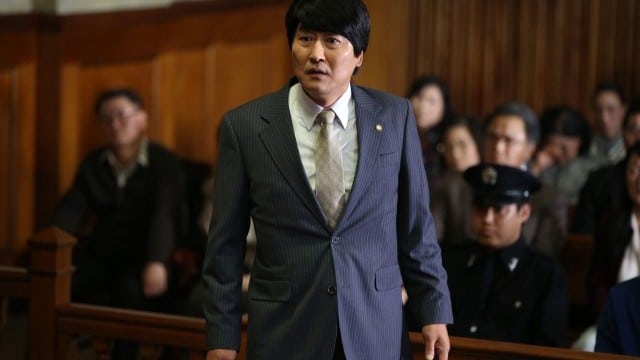
It’s easy to forget for those of us in the United States that as recently as the mid 1980s South Korea was under a military-led despotic rule. Post-war Korea saw universities and libraries at risk of closure, free speech and freedom of the press curtailed, and the concept of democracy destined to be little more than a dream. That ended less than thirty years ago, but for many South Koreans it must seem like only yesterday. Their action/revenge films may be the ones that most frequently reach our shores, but the Korean film industry also has a subgenre of films exploring this delicate and frightening time in their relatively recent history.
Im Sang-soo’s excellent and absurd The President’s Last Bang is one of the more well-known examples, and Yang Woo-seok’s The Attorney begins roughly around the same time in the late ’70s. Song Woo-seok (Song Kang-ho) is a lawyer whose lack of “proper” education has forced him to be craftier in his trade than those around him. His tactics earn him scorn and derision along with a healthy income, but his thirst for cash takes a backseat when he stumbles into a case involving government-sanctioned torture of Korean citizens.
On the surface, The Attorney is a David & Goliath-type tale about a lone lawyer standing up for what’s right against the power and threats of a corrupt police department and legal system. It works well enough on that front to satisfy viewers looking for a dramatically thrilling story, but the film earns extra power by being based on a true story. In addition to being an entertaining courtroom drama, this is also a fascinating (albeit fictionalized) glimpse into the life of Roh Moo-hyun, the lawyer the film is based on and who would eventually go on to become president of the nation.
“You can throw dozens of eggs, but it can’t hurt a boulder.”
Song Woo-seok (crafted from the names of the star and director) catches wind of a legal change that allows lawyers to handle notary services and forms a successful business from it. More traditional lawyers laugh and scoff, and more traditional notaries grow angry, but Song makes a name for himself. He continues to live the high life willfully ignorant of the growing political and social changes around him. Student protests against the government in 1981 lead to crackdowns and arrests as a red scare similar to our own McCarthy era takes hold. Song sees the protests as pointless and ignores the plight of those affected until a friend comes to him with a request.
Her son has been arrested for being part of an “anti-government” book club, an incident based on the real-life “Burim case,” and in addition to being held without notification, visitation, or any rights at all, he’s also been subjected to torture in the pursuit of a confession. Song’s conscience slowly gets the better of him, and against all manner of better judgement he takes the case. What follows is his pursuit of the truth against seemingly insurmountable odds, threats to his family and well-being, and the risk of losing everything he’s worked so hard for to this point.
The justification for the government and police department’s behavior stems from a mix of a hunger for power and an ingrained fear in their neighbors to the north. “You think the war is over?” asks a cop to Woo-seok. “It’s called an armistice. This is just an intermission.” There’s truth to that statement, and its use as ammunition for breaking laws and stripping citizens of their rights doesn’t detract from that fact. That dichotomy is part of what makes the story work, and while it’s never made the main thrust of the tale the fear is left to lay just barely out of frame.
Yang’s film is about this time in his country’s history, but it works as well as it does because it’s also about one man’s life. The script and [Song] Kang-ho’s warm and energetic performance make [Song] Woo-seok into the kind of shaggy (metaphorically speaking) underdog audiences love to root for. The first act wisely focuses on Woo-seok’s risky rise to prominence as a lawyer while also showing us the family man at his core. Key to this is Kang-so’s performance as such a lengthy setup risks losing audience attention and interest. He’s simply a joy to watch, something anyone who’s seen Memories of Murder, Thirst, or Secret Reunion can attest to.
Kang-ho’s the lead, but there’s talent to spare here throughout the supporting cast. Kwak Do-won offers an intense and chilling portrayal of the police department’s lead investigator into National Security matters and subsequent lead torturer, while Kim Young-ae delivers the expected angst and powerful emotional displays as the mother hoping to free her son. Oh Dal-su meanwhile brings a much-needed lighter touch and humor to many of his scenes as Woo-seok’s assistant and sidekick.
The Attorney will undoubtedly play better in its home country where the historical subtexts are far more familiar, but U.S. audiences should find the drama, thrills, and personality they’ve come to expect from courtroom-centric movies.
The Upside: Song Kang-ho is a magnetic and contagious performer; supporting cast is strong; fascinating glimpse into South Korea’s recent history
The Downside: Courtroom scenes not always played as suspenseful/dramatic as they could be; final scenes may lack impact for Western audiences
On the Side: Roh Moo-hyun, the real life lawyer the film is loosely based on, became president of South Korea in 2003. He committed suicide six years later.
